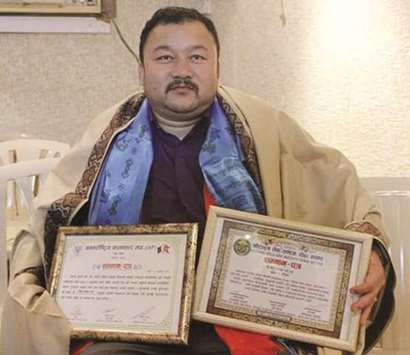The Nepali community in Qatar is deeply involved in literary activities. Three organisations that are actively involved in promoting Nepali literary activities in the country are International Nepali Literary Society-Qatar, Nabodit and Muglani Saugaat.
These organisations invite writers from Kathmandu and ask them to recite their poems or give lectures in Doha. Dr Abhi Subedi, Saru Bhakta, Aahuti, Khagendra Sangroula, Prof Govinda Bhattarai, Bimal Nibha and Shrawan Mukarung are some of the Nepali writers who have visited Qatar in the past.
Tirtha Sangam Rai, the former president of International Nepali Literary Society (INLS), is a prominent name in the Qatar-based Nepali literary fraternity and is actively involved with all organisations. Community caught up with him to talk about the Nepali literary activities in Qatar.
Following are the excerpts:
When and why was INLS was established?
INLS was established in the US in 1990. INLS-Qatar was set up on August 25, 2006. INLS and its Qatar branch were established as umbrella organisations for non-resident Nepali writers, to institutionalise literary writing and to promote Nepali literature to a larger audience. There are around 210 INLS branches across the globe.
About how many Nepali writers are there in Qatar?
There are around 200 people who pen literary works in their free time. They are publishing their works on different online platforms.
How many of them are associated with INLS?
We have a 15 member working committee of INLS, five advisers, 36 lifetime members and 21 general members. There are about 50 others associated with our organisation.
What is literature? How do you define it?
I get this question in every interview and each time I give a different answer. Literature evolved right from the time human beings came into existence. Literature is changing with time and space – it is always associated with the nature of society in which we are living. Literature is not only an expression in linguistic form. To me, any beautiful invention of human society is literature. Literature doesn’t have class, caste and country – it transcends all of those categories.
Is literature essential or just a leisure activity? How do you assess the Nepali literary work being produced in Qatar?
Reading and writing of literature keeps one in sound mind. It supplies us with positive thoughts and energy. One can reduce fatigue and exhaustion by reading and writing. The culture of reading and writing keeps our mind active and alert. Nepali literature is expanding more outside the country in terms of professionalism and promotion. Writers based in Kathmandu are taking trips across the world to meet their readers and listeners. In Qatar alone, we have invited more than a dozen Nepali writers.
Expatriates contribute immense to the Nepali language literature – but are they acknowledged in the Kathmandu literary circle?
First, I want to segregate the Nepali diaspora into two – temporary and permanent. Those who have abandoned Nepali citizenships for other countries fall into the second category. Those who work in Gulf and East Asia are the temporary diaspora. Literature from both sections is seriously accepted in Kathmandu. But, the temporary diaspora is a little bit looked down upon compared to those in Europe and North America.
What are the themes expressed by Nepali writers in Qatar and Gulf region in their literary works?
There are two kinds of Nepali writers in Qatar and Gulf region – those who have been writing even before they came here and those who started writing after moving abroad. Writers in the first category have much practice in writing and pen poems, songs, ghazals, essays and stories. Nepali writers here mostly write about life in Qatar, longings for their homeland and their identity as Nepalis. A certain melancholy underpins their writing.
What are the regular programmes you organise here to promote Nepali language literature?
Since its inception in 2006, INLS has been regularly organising events to mark the birth anniversaries of great Nepali writers – Laxmi Prasad Devkota, Bhanu Bhakta Acharya, Motiram Bhatta and Parijaat. At events marking the birth anniversary of Great Poet Laxmi Prasad Devkota, we invite prominent poets to recite their poems. On every birth anniversary of Motiram Bhatta, we organise ghazal recitals. We also organise regular literary programmes on the second Friday of each month. We publish literary works and organise regular programmes in Al Khor with the help of the literary magazine Muglani Saugaat.
Apart from Nepali language, do you provide space for writers in other Nepali languages?
There are many writers who write in languages other than Nepali. We have some Maithili poets. On every World Indigenous Day, we organise a poetry competition in Qatar in which writers recite their poems written in their own dialects.
What do you think is the contribution of Qatar-based writers to the Nepali literary canon? Do you have any message for your readers and fellow writers?
I love Qatar as much as I love Nepal. I respect the law and culture of this country. I have earned a living here and become able to support my family. Moreover, Qatar is the place where I practised writing and got inspired to put my feelings into words. There are different choices and preferences, of both readers and writers.
But I try to incorporate suggestions and criticisms from my readers.
We work in Qatar, so our writings are related to leaving the homeland.
We have a rustic and melancholic voice, and we write despite our busy schedules. I request all to look at our writings and provide suggestive criticisms.

HONOURED: Tirtha Sangam Rai was recently honoured for his literary activities in the country.
